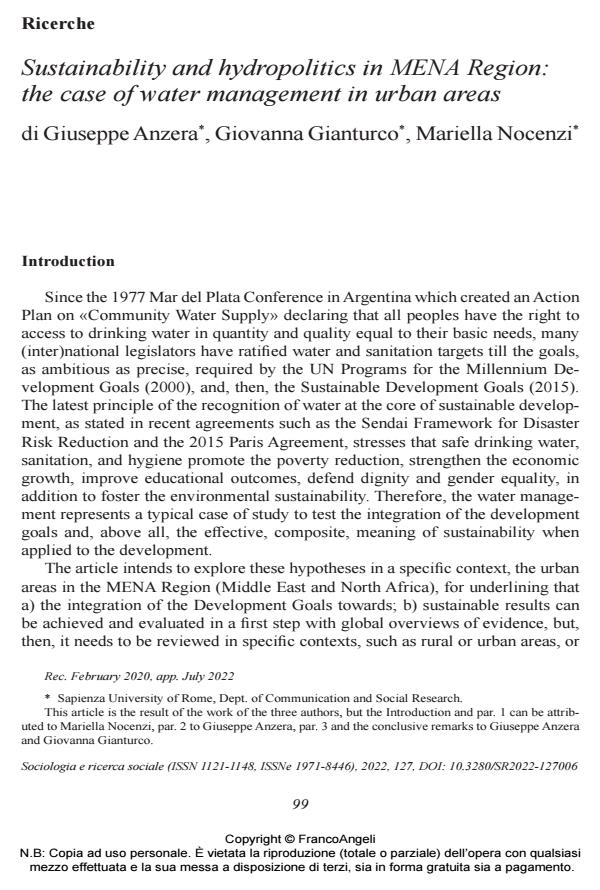Sustainability and hydropolitics in MENA Region: the case of water management in urban areas
Titolo Rivista SOCIOLOGIA E RICERCA SOCIALE
Autori/Curatori Giuseppe Anzera, Giovanna Gianturco, Mariella Nocenzi
Anno di pubblicazione 2022 Fascicolo 2022/127
Lingua Inglese Numero pagine 20 P. 99-118 Dimensione file 210 KB
DOI 10.3280/SR2022-127006
Il DOI è il codice a barre della proprietà intellettuale: per saperne di più
clicca qui
Qui sotto puoi vedere in anteprima la prima pagina di questo articolo.
Se questo articolo ti interessa, lo puoi acquistare (e scaricare in formato pdf) seguendo le facili indicazioni per acquistare il download credit. Acquista Download Credits per scaricare questo Articolo in formato PDF

FrancoAngeli è membro della Publishers International Linking Association, Inc (PILA)associazione indipendente e non profit per facilitare (attraverso i servizi tecnologici implementati da CrossRef.org) l’accesso degli studiosi ai contenuti digitali nelle pubblicazioni professionali e scientifiche
Water is a vital asset used in public and private activities, both with domestic and productive targets. As freshwater is unevenly and irregularly scattered, some regions of the world acutely suffer from water scarcity. Limited access to safe drinking water and lack of adequate sanitation facilities in most devel- oping countries, as the rapid urbanization, have caused serious water scarcity and water pollution problems. Then, the global warming caused by burning of fossil fuels has negative impacts on the hydrological cycle and consequently unfavorable changes in water quality. In the Mediterranean basin, some regions, as the Middle East and North Africa (MENA), are encountering sever social, economic and environmental issues related to water management. As the UN Agenda 2030 Sustainable Development Goal 6 points out it’s irreversible to ensure availability and sustainable management of water and sanitation for all. Finally, it is possible to make the growing urban areas more sustainable (Goal 11), assuming water not more as a losing item for the MENA Region development, but as a strategic tool for facing persistent imbalances and for riding the overwhelming changes.
Giuseppe Anzera, Giovanna Gianturco, Mariella Nocenzi, Sustainability and hydropolitics in MENA Region: the case of water management in urban areas in "SOCIOLOGIA E RICERCA SOCIALE " 127/2022, pp 99-118, DOI: 10.3280/SR2022-127006